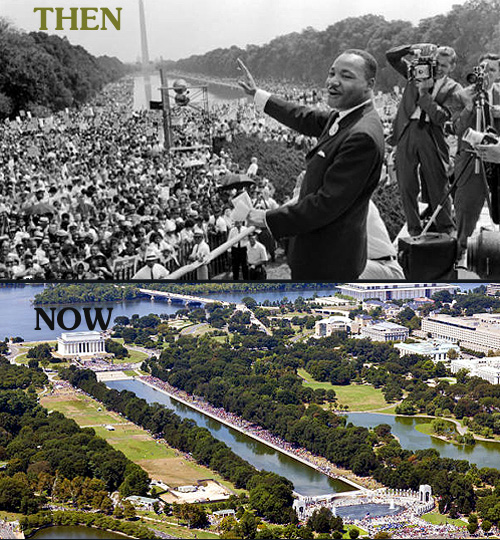 “Tens of thousands” gathered in Washington, a fraction of the original march fifty years ago. In Africa it was hardly noticed. Why only a sputter, now?
“Tens of thousands” gathered in Washington, a fraction of the original march fifty years ago. In Africa it was hardly noticed. Why only a sputter, now?
The answer may be the same in Africa as here at home. National spirits have been whipped to death by the Great Global Recession and the Right’s successful control of its recovery.
King’s Legacy when compared to the struggles in Africa seems unfulfilled if now not outright desperate.
Obama’s first election in 2008 was a time when Martin Luther King was evoked almost daily in the African press. Even before Obama’s election, Africans began constructing King’s legacy as leading directly to Obama’s accession:
Kenyan scholar, Jerry Okungu writing on the 40th anniversary of King’s death as Obama’s elections were being excitedly anticipated, called King “first among equals” in civil rights movements for “Americans and indeed the world.
“Many Africans at the time got inspiration from King’s movement as freedom fighters in Africa,” Okungu continued.
But today?
Almost nothing. As Obama has seemed to sputter out, so has the King Legacy:
The more important fiftieth anniversary is being reported and analyzed only as republications of global news services reports.
Searches I made in major newspapers and journals throughout sub-Saharan Africa turned up little to nothing.
Only the Times of South Africa (Live edition) and South Africa’s main television network carried more than a single story.
But those two outlets do provide some explanation for the weak interest throughout Africa:
“Despite big gains politically and in education,” Times Live reports, “far more needs to be done to achieve the colour-blind society that King envisioned.”
In the second filing, Times Live explains that one of the great accomplishments of the 1963 March was the Voting Rights Act, and now, “The future of that law has been called into question [by] the US Supreme Court.”
That same story continues, “[Black American’s] 12.6% seasonally adjusted unemployment rate in July was double the national figure.”
South Africa’s state-owned and largest television network had a correspondent at the rally, and she reported, “Social and economic gaps between whites and African-Americans have only widened over the last five decades.”
She ended her single story filing: “nowhere is [the] commemoration felt more accurately than in Washington DC itself which is still a deeply segregated city.”
South Africa, in particular, is not even a generation from its significant revolution that ended apartheid and created a fabulous new constitution for the modern age.
America is seen as dragging its feet as it bumbles its way socially into the modern age. I don’t think there’s any disrespect at all for Dr. King, quite to the contrary.
But when seen through African eyes – particularly South African – the story of Martin Luther King, Jr., is one at best a tragically unfinished and stretched out story. One, in fact, that is being rolled backwards, not forwards.
Africans are extremely polite and remarkably restrained especially when it comes to criticizing good will that’s just not working.
That, in my opinion, is how enlightened Africans saw this weekend’s march. “A dream is a wish your heart makes” but that the body America can’t quite accomplish.